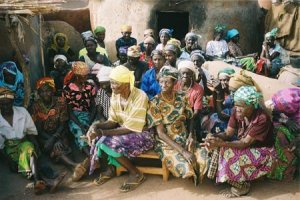While others chose to organize feast for their mothers on the occasion of this year’s Mother’s Day, Action Aid-Ghana and its partners visited the Kukuo alleged witches camp in the Nanumba North district of the Northern region to restore hope in the banished women.
The organization among other interventions reroofed about 25 of the dilapidated mud houses where the inmates have been camped for ages. The Country Director of Action-Aid Ghana, Madam Adwoa Kluvitse who joined the communal labour reiterated the need for the total liberation of the alleged witches.
She admonished the Ministry of Women and Children Affairs to lead the crusade towards the implementation of the roadmap to disbanding the witch camps and reintegrate the inmates.
She also impressed upon the Ministry of Local Government and Rural Development to complement the efforts of development partners by assisting the inmates with the needed infrastructure to alleviate their plight. Madam Adwoa recalled the two days stakeholder’s conference held in Tamale on the disbandment of the camps where the major stakeholders including the alleged witches network made these demands.
“We demand that government must in the interim meet the immediate needs like food, shelter, water and health of the camps’ inmates as often done for people in distressed conditions.” “Government must establish a specific programme with definite budget, accompanied with a roadmap to the disbandment.”
“The roadmap must be developed in consultation with all stakeholders including the alleged witches, Religious and Traditional leaders, Priests, CSOs and the communities of origin of the alleged witches.”
“Government must also put in place a specific, pragmatic and operational legal regime that will halt fresh witchcraft allegations and ensure the safe reintegration of the women and their dependants into any community of their choice.”
Most of these communities where the camps exist lack basic facilities such as hygienic source of drinking water, electricity, educational and health centres. Available statistics indicate that there about 3000 inmates in those camps.**
Regional News of Sunday, 13 May 2012
Source: GNA

















